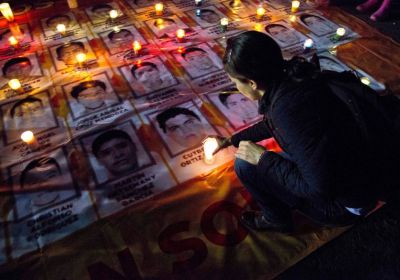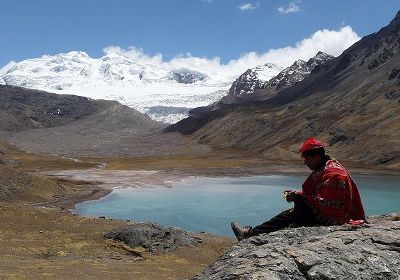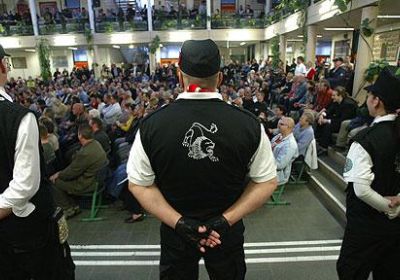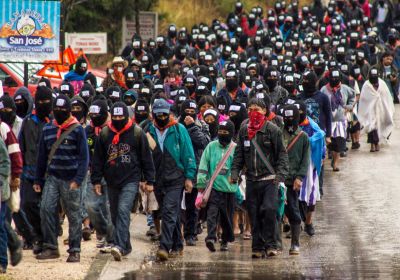
-
 If history is any guide, it is reasonable to assume that Greece’s recently-elected left-wing SYRIZA government will be subjected to a foreign-backed destabilisation campaign and possible attempts to install a new right-wing authoritarian regime. There is a long history in Greece of the left being suppressed by the oligarchy collaborating with outside forces.
If history is any guide, it is reasonable to assume that Greece’s recently-elected left-wing SYRIZA government will be subjected to a foreign-backed destabilisation campaign and possible attempts to install a new right-wing authoritarian regime. There is a long history in Greece of the left being suppressed by the oligarchy collaborating with outside forces. -
 In Australia, the life of a teaching student comes with certain inconveniences, but not acute physical danger at the hands of law enforcement, political authorities and organised crime. Sadly, that is not the case in Mexico. On the night of September 26-27 last year, in the southern state of Guerrero, police attacked a bus convoy taking a group of students from their normales rurales (rural teaching college) in Ayotzinapa to the city of Iguala.
In Australia, the life of a teaching student comes with certain inconveniences, but not acute physical danger at the hands of law enforcement, political authorities and organised crime. Sadly, that is not the case in Mexico. On the night of September 26-27 last year, in the southern state of Guerrero, police attacked a bus convoy taking a group of students from their normales rurales (rural teaching college) in Ayotzinapa to the city of Iguala. -
Going round in circles Like the fans overhead His mind can’t get the words out And the spirit weighs like lead Join the team, Recurring dream, Kill Team, Kill Team The heat it has no ending And the isolation stings Is this what they call ‘R&R’, A bird with shattered wings? Join the team, Recurring dream, Kill Team, Kill Team The face of that civilian Lurks in fragile fits of sleep They murdered him for sport And laughed to hear his widow weep Join the team, Recurring dream, Kill Team, Kill Team Routine operation, Chopper dust-off, village street,
-
 Peru will host the UN-sponsored Conference of Parties climate talks this December. The world’s peak climate conference, the COP is an annual event first held in Berlin in 1995, leading to provisional developments such as the Kyoto Protocol. Peru is also a country increasingly affected by the consequences of climate change. A study published by the United Nations Development Project said: “Peru has been ranked third globally in terms of risk to climate related disasters.”
Peru will host the UN-sponsored Conference of Parties climate talks this December. The world’s peak climate conference, the COP is an annual event first held in Berlin in 1995, leading to provisional developments such as the Kyoto Protocol. Peru is also a country increasingly affected by the consequences of climate change. A study published by the United Nations Development Project said: “Peru has been ranked third globally in terms of risk to climate related disasters.” -
 Jobbik, a far-right ultra-nationalist racist party established in 2007, made significant electoral gains in the Hungarian elections, garnering just over 20% of the national vote in the April poll. Under Hungary’s system of proportional representation, this result (up 5% from last showing) makes Jobbik Hungary’s second-strongest party. This assures it a significant agenda-setting presence in an already right-wing dominated parliament.
Jobbik, a far-right ultra-nationalist racist party established in 2007, made significant electoral gains in the Hungarian elections, garnering just over 20% of the national vote in the April poll. Under Hungary’s system of proportional representation, this result (up 5% from last showing) makes Jobbik Hungary’s second-strongest party. This assures it a significant agenda-setting presence in an already right-wing dominated parliament. -
 The Tony Abbott government has recently been at pains to emphasise that it is “protecting” the community from Australian-born “jihadists” returning from participation in conflicts in the Middle East. Having learned the tools of the terrorist trade in zones of sectarian strife, they argue, these “extremists” might well embark on a campaign of politically-motivated civil slaughter in this country. Citing this as a motivating factor, the Department of Foreign Affairs and Trade has recently cancelled several Australian passports.
The Tony Abbott government has recently been at pains to emphasise that it is “protecting” the community from Australian-born “jihadists” returning from participation in conflicts in the Middle East. Having learned the tools of the terrorist trade in zones of sectarian strife, they argue, these “extremists” might well embark on a campaign of politically-motivated civil slaughter in this country. Citing this as a motivating factor, the Department of Foreign Affairs and Trade has recently cancelled several Australian passports. -
 Sixty years ago, in June 1954, a CIA-orchestrated coup ousted the reformist Guatemalan government of Jacobo Arbenz Guzman. The coup installed a brutal right-wing regime and decades of bloody repression. This event, so notorious in the annals of US imperialism, also Guevara. For it was in the Central American nation, where Guevara's Latin American road trip culminated, that the strands of his early thought Marxism, anti-imperialism, indigenismo were fused in a dramatic, galvanising moment.
Sixty years ago, in June 1954, a CIA-orchestrated coup ousted the reformist Guatemalan government of Jacobo Arbenz Guzman. The coup installed a brutal right-wing regime and decades of bloody repression. This event, so notorious in the annals of US imperialism, also Guevara. For it was in the Central American nation, where Guevara's Latin American road trip culminated, that the strands of his early thought Marxism, anti-imperialism, indigenismo were fused in a dramatic, galvanising moment. -
 It is difficult to accept that NSW Premier Barry O’Farrell lost his position over the alleged gift of a $3000 bottle of Grange connected with the push to award lucrative contracts to Australian Water Holdings (AWH). Conceivably, he could have stonewalled that accusation and ridden out the storm had he enjoyed the backing of cabinet and the Daily Telegraph.
It is difficult to accept that NSW Premier Barry O’Farrell lost his position over the alleged gift of a $3000 bottle of Grange connected with the push to award lucrative contracts to Australian Water Holdings (AWH). Conceivably, he could have stonewalled that accusation and ridden out the storm had he enjoyed the backing of cabinet and the Daily Telegraph. -
 Imagine trying to win public approval for the following scenario: detonate a hydrogen bomb in a remote region of the Pacific that has little contact with the outside world, in meteorological conditions guaranteed to spread radioactive contamination for hundreds of miles, then refuse to evacuate those affected for days finally taking the affected communities to research facilities for extensive and intrusive testing.
Imagine trying to win public approval for the following scenario: detonate a hydrogen bomb in a remote region of the Pacific that has little contact with the outside world, in meteorological conditions guaranteed to spread radioactive contamination for hundreds of miles, then refuse to evacuate those affected for days finally taking the affected communities to research facilities for extensive and intrusive testing. -
With Newmont-Buenaventura set to resume building operations at the controversial Conga mine site this year, the Peruvian government has passed a new law granting legal immunity to security personnel who injure or kill protesters. The promulgation of Law 30151, which was officially gazetted on January 14 after being signed by President Ollanta Humala, indicates the state and its transnational corporate backers are planning an expanded campaign of repression against Peruvian communities resisting their neoliberal development model.
-

It stands to reason that the perpetrators of crimes against humanity have a vested interest in silencing those who speak out against them. So it is not surprising there has been an intensified campaign of repression in Pakistan against those speaking out against the US bombing campaign in Pakistan's north-west.
-

The tide of history sometimes surges out of the most unexpected places. Twenty years ago, the Zapatista indigenous uprising broke out in the southern Mexican state of Chiapas.